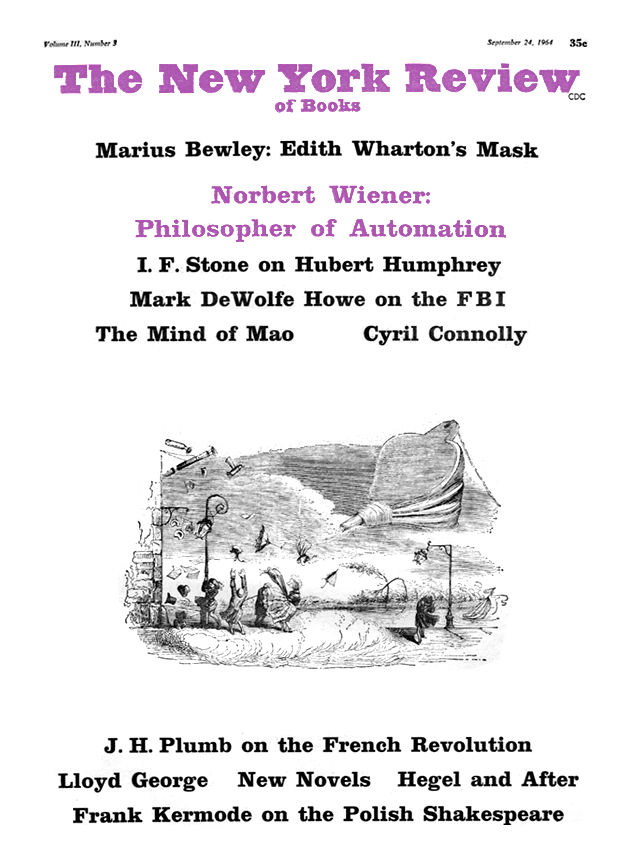In response to:
To Moscow Again from the July 30, 1964 issue
To the Editorss
I wish to comment on some points raised in F. W. Dupee’s very perceptive review of Chekhov’s The Three Sisters (July 3). Dupee speaks of the style of Chekhov’s language for the characters as sometimes coming close to that in the drama of the Absurdists. He describes the flow of remark that goes on in the play: “the disjointed flow of remark…and—as a last resort—the forays into plain nonsense. The verbalism of the play finds its ultimate form in nonsense.” He then gives three examples of this nonsense which are repeatedly used by Chekhov.
That the examples cited by Dupee are not “plain nonsense” but are really expressions of Chekhov’s subtlety and are can be shown by careful study of the Russian text, rather than the Garnett translation which Dupee is careful to say he has used. The undersigned has used the Russian of Gosizdat, Leningrad, 1935 and also has consulted all of the English translations available in the Library of Congress (C. Garnett, S. Young, J. Covan, J. West, E. Fen, A. Dunnigan, and others).
Dupee’s first example is as follows. “Solyony…torments his prospective victim with cries of ‘chook, chook, chook.” In Russian transliteration these words of Garnett’s actually sound closer to our English “cheep, cheep, cheep,” and Chekhov has Solyony speak in a soft voice, thus imitating the sound of small birds. He follows the words with having Solyony compare the Baron’s philosophical utterances with usually more nourishing cereal or porridge made of grain, for which Garnett uses the term “bread and meat.” Fen and Young use the words “cluck, cluck, cluck” and Fen even calls attention in her stage directions to Solyony’s imitation of chickens. While Covan uses “there, there, there” and the word “dinner,” Dunnigan gives “peep, peep, peep.” At any rate, the nonsense words seem to have our English equivalent meaning “Its for the birds.”
Dupee in his second example states “Masha and Vershinin like to communicate by means of a sort of Slavic love call: it goes “Tram-tam-tam.” However, the first use of this phrase by Chekhov (Act III) is preceded by Vershinin’s singing the first two lines of a celebrated aria for bass, Prince Gremin’s Air, from Tschaikovsky’s Eugene Onegin, from the poem by Pushkin. The so-called nonsense syllables follow the rhythm of the succeeding lines of the aria, in which Gremin praises love to Onegin who has just fallen in love with Gremin’s wife Tatiana. The authorized Metropolitan Opera English version by Reese gives “All men surrender to love’s power. Her joys bring ev’ry age to flower…” Nabokov has just translated the corresponding Pushkin lines as “All ages are to love submissive…its impulses are beneficial….” Garnett has “Young and old are bound by love, and precious are its pangs…” Dunnigan, Young, Fen, and Covan have other variations. The justly successful opera was first produced in 1879 with its first public presentation in 1881 in Moscow. With the introduction of this aria, Checkhov anticipates Masha’s final renunciation of Vershinin, since Tatiana renounces Onegin and remains faithful to Gremin. Chekhov also uses Pushkin’s lines from Ruslan and Ludmilla “By a curved sea-shore is a green oak-tree. On the tree is a golden chain…” for Masha repeatedly from the first act, when she complains the phrase has been haunting her since morning. Its emphatic reintroduction towards the end of the play is used by Chekhov to emphasize Masha’s bonds and to contrast subtly with the earlier Pushkin poem to love, to which the “Tram-tam-tam…” interchange refers.
Finally, what Dupee calls “a ballad or folk-song refrain”: “Tarara-boom-deay,” is not quite complete as Garnett gives it. Although Chekhov’s Russian is very slightly different, it still suggests the musical comedy of that time, but Garnett’s translation (used by Dupee) repeatedly omits the following rhymed line of the Russian, meaning “I am sitting on a curb-stone.” The other translator (except Covan) include it, although Fen renders it as “I’m sitting on a tomb-di-ay,” and West incredibly gives it as…”It is my washing-day.” Actually Chekhov closes the play with Olga’s “If we only knew!” This clearly refers to the sisters’ preceding dialogue in which they attempt to project into the future their dreams of fulfillment. To my way of thinking Chekhov appears to contrast the non-participating “curbstone sitting” of the old doctor with the sisters’ acceptance of their suffering and of their new roles in paving the way for happiness in the lives of those who will live after them.
Although Dupee evidently is handicapped by his lack of knowledge of Russian, he does pick up the central issue when he describes the style of language Chekhov uses for his characters. “The usual distinctions between action and inaction, conscious will and sentient passivity, disappear as they do in dreams…” The psychoanalyst would consider Dupee’s examples of Chekhov’s dialogue as his characters’ tendency toward “primary process thinking,” that is, thinking most strongly influenced by unconscious processes as described by Freud (as in dreams, wit, slips, and so on). Thus, what Dupee calls “plain nonsense” on closer examination becomes not quite plain and not quite nonsense. However, with some knowledge of the original Russian, and also of psychoanalysis, these examples of Chekhov’s psychological understanding illustrate the major point made by Dupee, following Stanislavsky, that of “the profundity of Chekhov’s art itself.”
Zelda Teplitz, M. D.
Washington, D. C.
This Issue
September 24, 1964


